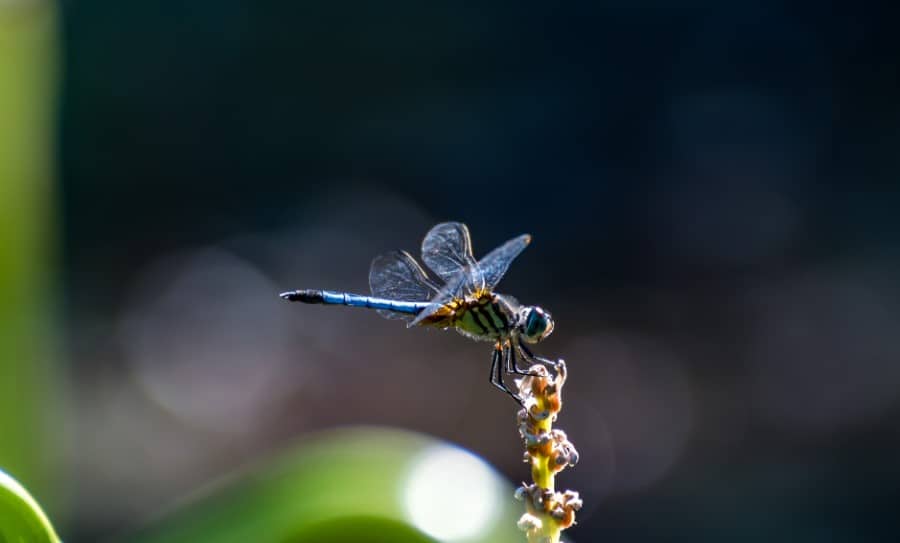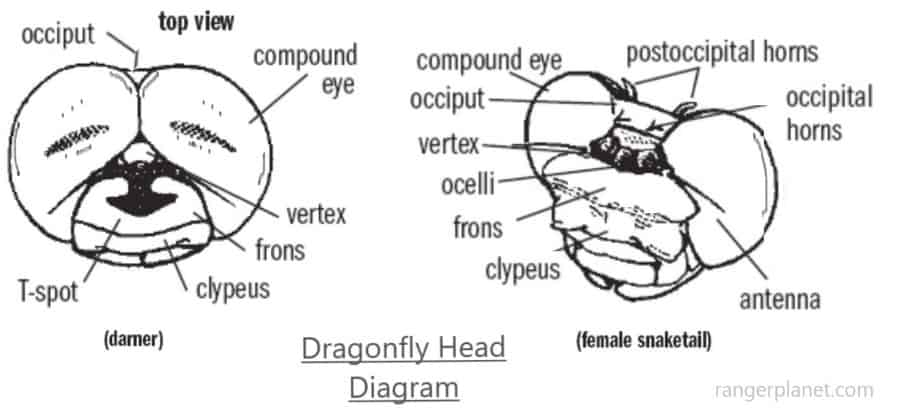Whether or not dragonflies bite is dependent on what exactly they are biting. When we ask that question about insects, we would immediately be thinking “do dragonflies bite humans?”
So in this article, we’re going to discuss do dragonflies bite, what they bite, adults and larva and other dragonfly biting facts. But first, here’s the quick takeaway answer…
Do Dragonflies Bite? Typically, the answer would be no – they don’t bite humans, although there are some exceptions to this rule, which we will look at later in the article.
So, yes dragonflies do bite their prey, but in terms of humans, no, dragonflies do not actively seek out humans to bite, they won’t land on a human, specifically in order to bite it and neither will they take a chunk out of you as they fly past.
However, if you rephrase the question slightly, then the answer changes to:-
Can dragonflies bite?
Yes, a dragonfly is capable of biting. In fact, they rely on their ability to bite in order to survive.
Being a carnivorous insect, dragonflies hunt other insects for prey; moths, midges, mosquitoes, butterflies and even other dragonflies. They will bite them and chew them before ingesting them.
So, if dragonflies didn’t bite their prey then they wouldn’t have a food source allowing them to survive successfully.
Dragonflies belong to the Odonata Order, a name which derives from the Greek word ‘Odonto’ which means tooth, another clear indicator of their biting ability.
Although dragonflies don’t actually have teeth they do have a variety of mouth parts that allow the insect to bite successfully – and while dragonflies bite – they do not sting.

What mouthparts do dragonflies have?
A dragonfly’s mouth is comprised of different components that all work together to assist with the insect’s bite function. The following two play a large part in this role;
- A pair of upper mandibles
- 2 pairs of maxillae
The maxillae are situated in the lower part of the mouth and are essentially used for holding the prey in place whilst the mouthparts responsible for administering the biting action get to work. Those mouthparts are the mandibles.
Mandibles are essentially the jaws of the insect. Their mandibles are positioned either side of the dragonflies’ head and controlled by abductor and adductor muscles to allow those cutting, chewing and crushing motions that jaws are so good at.
These jaw-like structures often have sharp points, as well as serrated knife-like edges to help with the task. They’re also hinged to give the dragonfly the option to open them really wide to accommodate larger prey.
Below is a diagram of the facial parts of a dragonfly, the mandibles are at the base of the image.

Any small prey is usually caught straight away by the mouth, but larger prey, such as moths, butterflies and dragonflies will be held by the front legs as well, to ensure the dragonfly has enough control to administer its bite.
Do dragonfly larvae bite?
Dragonflies begin their lives as larvae, usually nestled underwater somewhere waiting for the right time to emerge. Just like their adult counterparts, whether or not they bite depends on how we are asking the question.
Do dragonfly larvae bite? – again we think of ‘do they bite humans?’ – No, typically they don’t. As always, there are exceptions to this, but we’ll discuss them in the next section).
But again. If we rephrase it slightly:
Can dragonfly larvae bite?
Yes, dragonfly larvae can bite. Like their parents, they are ferocious carnivores that will feed on anything they can get their jaws into; insects, water snails, crustaceans, small fish and even other larvae.
They are equipped to do this because their lower jaw is extendable, meaning it can rapidly reach out and snap up prey as it passes.
What are the exceptions?
As with anything, there are always exceptions to the rules, and if we look at our question ‘Do Dragonflies Bite?’ in relation to humans, then yes – sometimes, they will bite humans.
However, this exception would more than likely only come about due to human action, not for the dragonfly’s penchant for biting people.
If a dragonfly was to bite a human, then chances are the human in question has done something to unsettle the insect.
More than likely, the dragonfly has been picked up and is being handled incorrectly. If this is the case, then the dragonfly will use its mandibles to deliver a bite in self-defense.
If you do ever find yourself bitten by a dragonfly, then do not be concerned – they are not dangerous or poisonous in any way.
In fact, it’s very unlikely that a bite from a dragonfly will even pierce the skin – unless it’s an incredibly large dragonfly – the larger the dragonfly, the larger the mandibles.
As mentioned in the previous section, there are also exceptions to the rules when considering dragonfly larvae.
Again, if a bite is administered from one of these creatures then it is likely to be given in self-defense, meaning that a human has unsettled them in some way.
Perhaps you’ve dislodged one whilst cleaning your pond, or a scientist may be studying one in the field – these larvae will only bite if they feel threatened. And again, like the adults, these bites aren’t, in any way, harmful.
Why do dragonflies bite?
We have to remember that dragonflies are like any other wild animal. There will be no emotionally driven reason why dragonflies would bite. There are two main reasons why a dragonfly would make the decision to bite you.
- The dragonfly feels physically threatened, or if held in such a way that makes it feel under attack a dragonfly may decide to bite you as a defense mechanism
- If the dragonfly perceives you as being a potential meal then it will also test the meal by biting it. This could also be the case if the dragonfly senses a salty taste to the meal. Many insects need small amounts of salt as part of their diet.
Are dragonflies aggressive?
Dragonflies, for the reasonably short time they are around (about 6 months), dragonflies are in a constant state of searching for food and scanning their territory.
So they are aggressive, but only in terms of hunting and capturing potential food. For this reason, they are only aggressive in terms of their determination to survive.
Learning resources
We’ve found the ideal resources to continue your learning at home and at school on amazon. Help support our efforts for wildlife causes and keep this site working for nature. Amazon also donates to wild-life related charities!
Dragonflies and Damselflies: A Natural History
Or you can catch Dragonflies to study them with these Adult and Children’s nets
Bug and Butterfly Telescopic Adult Net
Three Pack Bug and Butterfly Net for Children – with Bug Cage
Video resources
To finish…
We hope this has been helpful in understanding if dragonflies will, or do bite – in particular biting humans. Hopefully, now you might be less fearful when dragonflies are around and enjoy this splendid
